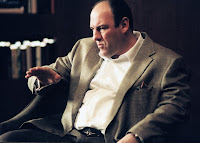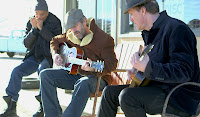Talk to any actor famous for a particular part and they will, more than anything else, do their level best to divorce fiction from reality. Star Trek's Leonard Nimoy even named his first autobiography I Am Not Spock to get some distance from fans who found it hard not to think of him as the pointy-eared Vulcan.
James Gandolfini - who died today at the age of 51 while on holiday in Italy - was a serious actor, with the Broadway chops to prove it. But when The Sopranos came along in 1999, and effectively rewrote series television drama as anyone had known it, Gandolfini breathed life into one of TV's greatest characters.
Gandolfini's casting as the show's focal point - a New Jersey mob boss balancing suburban family life with the complex politics of his business - appeared to be an uncannily perfect fit. And as the series progressed, through six seasons, it became clear that creator David Chase had produced something extraordinary. I would even argue that The Sopranos was television's greatest ever series. And Anthony John Soprano its greatest ever character.
Gandolfini was born in 1961 to Italian-American parents in Westwood, a town in north-eastern New Jersey and close to where he was living up until his death. After graduating in communications from New Jersey's Rutgers University, Gandolfini moved to New York and working as a bartender, amongst other jobs, until his acting career took off with a Broadway production of A Streetcar Named Desire in 1992. The following year he appeared in Tony Scott's True Romance as Virgil, an enforcer working for Christopher Walken's mobster Vincent Coccotti. It was a part that drew attention to Gandolfini when The Sopranos began casting.
There was, of course, far more to Gandolfini's canon than just Tony Soprano: at 6'1" and a substantial frame, Gandolfini filled the screen with presence in films like Get Shorty, The Mexican and most recently in Zero Dark Thirty as a Pentagon general.
This was a role he'd played before, in Armando Iannucci's big screen version of The Thick Of It, in which Gandolfini stole the show as a thunderously profane, Norman Schwarzkopf-style general who puts the equally potty-mouthed Malcolm Tucker firmly in his place for possibly the first time ever.
However, it was the role of Anthony John Soprano, crew boss in the fictional DiMeo crime family (said to be based on the real DeCavalcante family of New Jersey), who grew up in Newark's tough Ironbound neighbourhood the son of Johnny Boy Soprano before enjoying the comforts of life at 633 Stag Trail Road, North Caldwell in Jersey's considerably more upmarket Essex County.
The Sopranos was more than just another crime show. Part Shakespearian drama, part Greek tragedy, like The Godfather's depiction of the American dream, it depicted the American dream as suburban life.
Yes, it riled some Italian-Americans for being yet another portrayal of crime in their community, but it also held a mirror to modern day America, of modern American family life.
And that was the premise of Tony Soprano: a modern American dad balancing family life and 'family life', with random violence and moral ambiguity ever-present throughout.
"The Sopranos was ambiguous to the point where, to this day, I'm not really sure whether it was a drama or a comedy," it's creator told Vanity Fair last year.
If it was a comedy - and there were numerous funny moments (the best being the episode Pine Barrens, with Paulie Walnuts and Christopher Moltisanti lost in the New Jersey woods) - it was certainly humour of the darkest shade.
Gandolfini's portrayal of Tony Soprano drove that darkness to its core. Through all six seasons it's there, played out in the Soprano kitchen, at the 'Bing or Satrale's, at Vesuvio, and most critically in Dr. Melfi's counselling room.
"We lost a giant today. I am utterly heartbroken," Lorraine Bracco - who played Melfi - said today at news of Gandolfini's death. It's a sentiment that has been shared by many.
"We're all in shock and feeling immeasurable sadness at the loss of a beloved member of our family," a statement on the HBO website for The Sopranos said. [James] was a special man, a great talent, but more importantly a gentle and loving person who treated everyone no matter their title or position with equal respect. He touched so many of us over the years with his humor, his warmth and his humility. Our hearts go out to his wife and children during this terrible time. He will be deeply missed by all of us."
Since The Sopranos ended Gandolfini tried to put a little distance between him and his best known alter-ego. Acting, however, and particularly roles like Tony, had been useful. Last year he told the Associated Press that acting had become a means to deal with an inner rage.
"I don't know what exactly I was angry about," he said. "I try to avoid certain things and certain kinds of violence at this point," he added. "I'm getting older, too. I don't want to be beating people up as much."
Sopranos creator David Chase said today: "[James] was a genius. Anyone who saw him even in the smallest of his performances knows that. He is one of the greatest actors of this or any time. A great deal of that genius resided in those sad eyes."
Those sad eyes. In Tony Soprano, truly the window of the soul. And in James Gandolfini, a brilliant actor whose life has been cut so short. RIP.

























